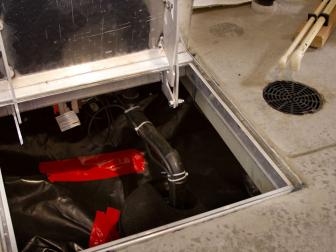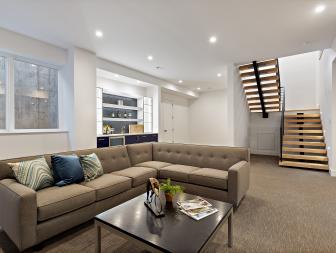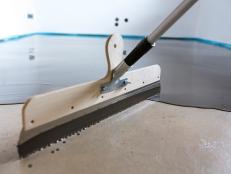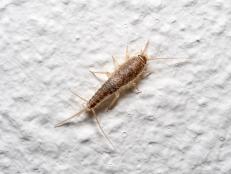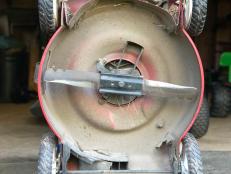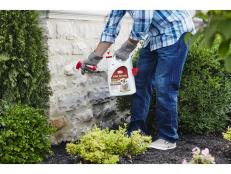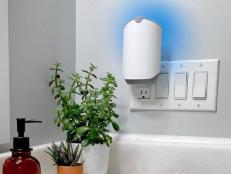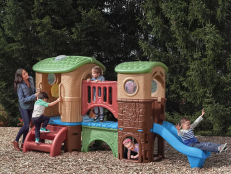How to Prevent a Flooded Basement and How Much It Will Cost to Fix
Waterproofing a basement can prevent structural damage, improve air quality, lower utility bills and make a finished basement a possibility. Learn how common water problems occur, how to fix them and how much you might expect to pay for remedies such as sealing, foundation repair and regrading your landscape.

Standing water, wall drips, condensation, mold-and-mildew issues — you likely don't need an expert to tell you there's a moisture problem in your basement. Identifying the cause is another matter entirely. Basements should be constructed to handle the typical moisture content of their surroundings as long as other aspects of the home are doing their part. The trouble begins when some other home component is not working or when you want to finish the basement, which requires a higher standard of moisture control. Waterproofing a basement costs homeowners $5,000 on average, but if the problems are minor and can be DIYed, that figure can be far less. Basement construction is variable, and particular problems plague certain locales, but at the end of the day there are only a handful of contributors to basement moisture — some outside and some inside.
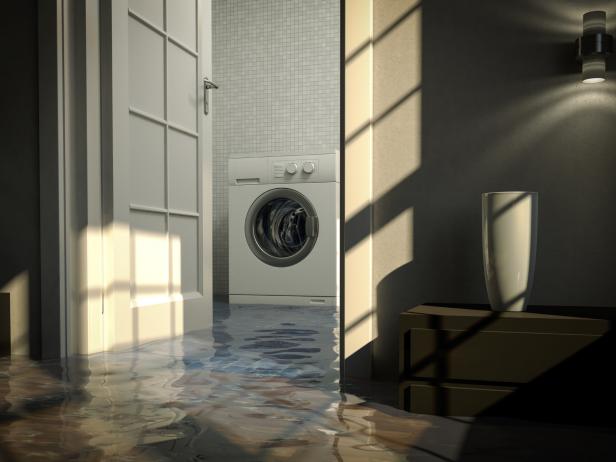
©iStockphoto.com/Bjoern Meyer
NOTE: The Inflation Reduction Act of 2022 allows homeowners to save up to $3,200 on their tax bills for 2023 (and through 2032) for upgrades that improve energy efficiency, through a federal income tax credit of up to 30 percent. Qualifying products include many mentions in this article: replacement doors, windows and appliances, as well as insulation efforts. Get specifics on the EnergyStar website.
Outside: Clogged Gutters and Downspouts
The Department of Energy (Energy.gov) reminds us that just a few inches of rainfall onto a roof can produce several thousands of gallons of water runoff. Guttering is made to contend with this runoff, but inadequate or clogged gutters and downspouts will simply channel that water straight into your basement.
Solution: This most common external cause of basement moisture is also one of the easiest and least expensive to remedy. Head outside when it's pouring and look at how your system is working. Guttering should be of sufficient size and appropriately graded to accept rainwater without overflowing. Downspouts of adequate size and placement need to direct water several feet away from the foundation or into a rain barrel for collection and later use. Set a year-round maintenance schedule: Leaves and pollen are common cloggers, and winter inspections in northern climates are critical to prevent ice from causing damage. Water freezing in gutters can force ice into shingles, causing roof damage too.
DIY or PRO: You can do it. The Gutters and Downspouts guide on Energy.gov has helpful advice on planning your roof drainage, and maintenance can be handled by homeowners.
Cost: If you do it yourself, gutter and downspout replacement runs $3-$40 per linear foot, depending on gutter material.
Outside: Grade of Ground Around the Home
Without an adequate slope away from the house, the ground around your home can direct rainwater into the basement.
Solution: Energy.gov recommends using clay-based soil to create a gentle slope that has its highest point at your foundation wall and drops 5% over 10 feet as you proceed out from the foundation into the yard. It's important to leave several inches of your foundation wall exposed, so if the existing ground is already too close to siding or shingle, you may have to remove it instead of adding soil. As part of this project, plan your landscaping to incorporate rain gardens with native plants that will suck up water as opposed to high-maintenance non-natives requiring constant irrigation.
DIY or PRO: Unless it's a minor regrading, you don’t really want to do it. If basement window wells are part of the problem, they may require repair or replacement — a pro job. And though adding dirt sounds easy enough if you are substantially out of grade or have a large home, getting the correct slope can be difficult and you'll need to rent heavy machinery. At the end of the day, you certainly don't want to solve your water problem by creating one for your neighbor.
Cost: Having a professional regrade your property runs about $1,400-$5,200, according to HomeAdvisor figures. Having a window well replaced could be as little as $500, but that number can creep into the thousands if the drain below is damaged or clogged.
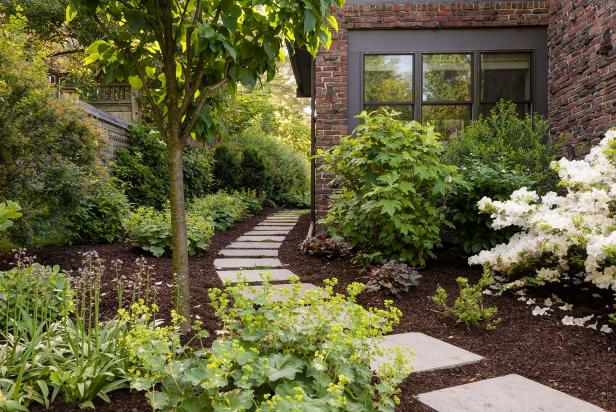
Rosemary Fletcher
Outside: Water Table Rise and Seasonal Flooding
Homes built in areas prone to flooding events or seasonal water table rise, and those homes without a functioning drainage system, can be susceptible to intermittent (and large) basement water problems. This may be the most irritating cause of basement moisture because it can be hard for the homeowner to diagnose and it's expensive to remedy.
Solution: This category of water problems is handled using a combination of a drain (or drains) and often a sump pump, a small mechanical pump in a dedicated pit in the basement that pumps out the water through a discharge pipe when water fills the pit. Most houses are built with one or more drainage systems, and the most important and efficient one is outside and under the foundation. If the home's exterior drain tile system has failed or is absent, you could be looking at a bunch of work: exposing the area around your foundation, sealing and insulating the foundation and installing a new system involving drain tile, pipes and fill. That said, interior drain systems also exist and are less expensive because they don't require excavating the foundation.
DIY or PRO: This issue generally requires a professional, particularly if you've fixed your gutters and grading but still see a problem. A sump pump installation can be within the capability of an ambitious DIYer, but at the very least it involves knowing where your existing utility lines are and digging through concrete to create the pit. Installing basement drains — inside and out — are jobs for the pros.
Cost: These projects can run anywhere from $300 for small clogs and sump pump repairs to as much as $15,000 for a new exterior drain tile system installation.
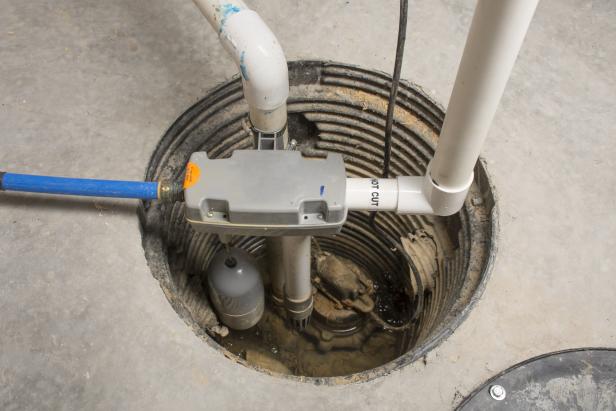
Outside: Foundation Cracks
Despite their sturdiness relative to most things in our lives, foundations are more flexible than you might expect. They breathe, settle and respond to the world around them. Because concrete is porous, it's vulnerable to such forces as capillary suction and vapor diffusion where groundwater migrates into drier areas. This type of moisture often can be responsible for that dank basement feel and mold-and-mildew issues. Hairline and cosmetic cracks are common in foundation floors and walls and are often no cause for worry, but some cracks will allow both air and groundwater to seep into the basement or be an indicator of a bigger problem. Size matters here, as does location and orientation.
Solution: We mentioned sealing the exterior of the foundation if it's exposed for repair: Internally applied barriers are an option, too, in the form of either a membrane (a thick sheet of plastic) or a liquid product you paint on. A membrane barrier is most often installed with an internal perimeter drain system present, so the system moves the water that does arrive to a drain and then outside. If you are waterproofing prior to finishing your basement, consider any sealing in conjunction with this work because finished walls and floor coverings have specific requirements for the foundation's condition. Regarding cracks: Small cracks can be fixed using epoxy, concrete products or polyurethane foam. Larger cracks may signal issues that could eventually require foundation correction, stabilization and reinforcement.
DIY or PRO: You can do the sealing, but adequate ventilation and personal protection are musts because effective liquid sealers are often high in VOCs. For cracks, DIY the little stuff only. Daniel DiClerico, writing for Consumer Reports News, recommends arranging a consultation with a structural engineer for any crack larger than 3/16" as well as those that are horizontal, expanding, bulging or buckling. He checks cracks with a No. 2 pencil: If you can push in the pencil to the yellow paint, call a pro.
Cost: Sealing the interior will cost $500 and up, depending on the method. Repairing small foundation cracks will run $250 and up if you get professional help. Larger foundation issues can cost as much as $15,000 to remedy. Foundation inspection reports average between $300 and $1,000, according to HomeAdvisor.

Outside: Air Leaks
Our final exterior source of basement moisture is a manageable one: air leaks. Warm air rising in the home will pull moist exterior air in through any openings, no matter how small.
Solution: Both sealants and insulation are our allies in the battle against air leaks. In its do-it-yourself guide, ENERGY STAR recommends using caulk or spray foam (depending on gap size) to seal all rim joists, the sill plate where the wall meets the foundation, and all pipe or duct entrances that pass through the foundation and also from the basement into the main floor of your home.
DIY or PRO: You can do it and it's remarkably inexpensive, with materials costing less than $100. To further inspire you, the Inflation Reduction Act of 2022 includes an Insulation Tax Credit that allows for a 30% deduction up to $1,200 for home insulation efforts annually. This includes products like weather stripping, spray foam and caulk.

Inside: Plumbing Leaks
Plumbing leaks from faucets and sinks are generally on our radar, but clogged or broken HVAC drain lines and poorly installed heating ducts are big basement moisture contributors, too, as are clothes dryer ducts. These latter offenders are particularly problematic because they are often hidden from view.
Solution: Perform regular checks for obvious plumbing and HVAC leaks. Ensure that your clothes dryer duct hasn't become disconnected within the wall — a surprisingly common problem — and has the appropriately sized (and routed) ductwork.
DIY or PRO: Both. Inspect your home regularly for small plumbing leaks. Broken drain lines and duct replacement are jobs you may need professional help remedying.
Cost: You’ll pay $150 or more for a pipe leak. Replacing an existing dryer vent will cost $100-$300 according to data from cost estimator, HomeGuide.
Easy Preventative Maintenance for HVAC Systems
Regular cleaning and maintenance will save you money and extend the life of your heat pump or HVAC unit.
Inside: Regular Appliance Use
Even without leaks, regular use of appliances in the kitchen, bathroom and laundry room can be huge internal contributors of basement condensation. Similarly, HVAC units themselves — often installed in basements — can raise humidity levels if you neglect regular maintenance or use an inappropriate fan setting for your climate.
Solution: Increase ventilation by adding HVAC vents to the basement area, using windows and ceiling fans regularly and ensuring that all bathrooms and kitchens have externally vented extractor fans. A dehumidifier can be installed as a part of your HVAC system or purchased as a standalone unit. For significant issues, install humidity-triggered exhaust fans in walls or windows. Consult your HVAC manufacturer for recommended settings and adhere to maintenance and filter-changing schedules.
DIY or PRO: Both. Homeowners can set up maintenance and ventilation schedules. Adding vents to your HVAC system or exhaust fan installation that requires cutting through foundation walls could be jobs for a professional.
Cost: Air quality solutions start at around $200 for a good humidity-triggered fan or dehumidifier, and go up from there based on installation complexity.
First Steps to Getting a Dry Basement
As you can see, there's no one-size-fits-all option for basement waterproofing, but much of the initial assessment can be done by an attentive homeowner. Energy.gov and its Building America Solution Center have helpful guides on correctly remedying basement moisture problems, and county and university extension offices are fantastic sources of free information pertinent to your locale. For a crash course on foundation science, start with the guide written by the building scientists at the University of Minnesota Extension Office.
If you live in a relatively dry climate without flooding issues and your basement is in good shape, handling basement moisture may well be within your purview and accomplished by checking the roof drainage, simple maintenance and some internal dehumidifying and ventilation options we discussed. It is wise to try these inexpensive remedies first. If you are experiencing regular flooding or suspect foundation problems, then it's best to pay a home inspector or a structural engineer for an assessment. Though you'll pay for their knowledge, they aren't invested in project completion and can prevent you from being oversold later with expensive products that may be unnecessary for your home's issues. Plus, some of the simpler problems discovered may be within your wheelhouse to remedy. BDry and other national basement waterproofing companies offer free estimates for professionally installed all-in-one packages tailored to your basement needs that employ many of the waterproofing strategies mentioned in this article.
If a finished basement is your ultimate goal, basement contractors and design-build companies can waterproof your space and then finish it to spec for you. Jamie Saer with FBC Remodel, a basement finishing firm in Denver, says that his company solves water issues for homeowners all the time, and he starts by checking the first two exterior issues we mention: guttering and grading. If there is potential for any future problem, they go ahead and line the walls with a moisture barrier that routes water to an interior perimeter drain system with a sump pump as a precaution: “We have done this before and it is a great system! You just need to make sure your sump pump is working and create a consistent schedule for checking its operation.”








